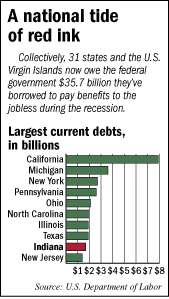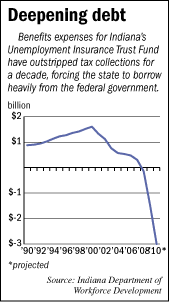Subscriber Benefit
As a subscriber you can listen to articles at work, in the car, or while you work out. Subscribe Now
Hoosier legislators are crowing about the deal they just brokered to delay a $400 million state tax hike meant to shore up
Indiana’s bankrupt Unemployment Insurance Trust Fund. Business advocates are gleeful, too. The Indiana Chamber of Commerce
even sent out a press release comparing the one-year tax delay to a March Madness buzzer beater.
Here’s what they’re not touting: the mandatory $21-per-employee federal tax increase every single business in
Indiana now faces in 2011. Or the $42-per-employee hike looming in 2012, and the $63-per-employee hike scheduled the year
after that.
Those federal taxes are slated to keep automatically increasing until Indiana’s unemployment insurance trust debt is
either retired, or state legislators agree to pay it off with a combination of local tax hikes and benefit cuts. The debt
is projected to reach $3 billion by the end of this year and keep growing to Godzilla-like proportions.
 Indiana isn’t alone in its dilemma. During the economic slump, 31 states and the U.S.
Indiana isn’t alone in its dilemma. During the economic slump, 31 states and the U.S.
Virgin Islands have borrowed a collective $35.7 billion to pay unemployment insurance benefits to the jobless. Nine more states
are on the verge of borrowing. By 2012, their combined debt is projected to reach $93 billion.
Indiana’s legislators agreed to the one-year delay to allow time for an economic recovery to take hold and the national
unemployment insurance debt landscape to settle. Many are hoping that, in the interim, the federal government orchestrates
a bailout.
But that may be wishful thinking. The appetite in Washington, D.C., for expensive state stimulus measures is waning. And
plenty of lobbyists already are arguing that employers, rather than Uncle Sam, should shoulder the costs of replenishing insolvent
unemployment trust funds.
“Business preaches to us all the time about the dangers of overly generous unemployment programs, and people staying
unemployed longer because we’re paying more benefits,” said Rick McHugh, staff attorney for the New York-based
worker’s rights advocate, the National Employment Law Project.
“If we basically bail out states because they haven’t responsibly financed their programs, it tells states that
did they made a mistake in taxing themselves at an adequate rate.”
“Moral hazard is the word for it,” McHugh added. “It applies to employers as much as workers.”
 It seems like a distant memory now, but back in 2000, Indiana’s unemployment
It seems like a distant memory now, but back in 2000, Indiana’s unemployment
insurance trust had a $1.6 billion surplus, and legislators debated what to do with it. Over the subsequent decade, they chose
to shell out more in benefits than they collected in taxes every year, which gobbled up the surplus and then some.
Here’s how unemployment insurance taxes work: Businesses must annually pay Indiana up to $392, or as much as 5.6 percent
of the first $7,000 of every employee’s salary. Each employer’s tax rate is based primarily on its history of
layoffs.
Legislators in 2009 agreed to raise $400 million by increasing the wage base to $9,000 and boosting the top tax rate to 8.2
percent. Those changes—now delayed one year—take the highest per-employee tax to $738.
On top of the state taxes, the federal government levies its own payroll tax to underwrite unemployment insurance. The federal
rate is 6.2 percent of the first $7,000 in wages, or up to $434 per employee.
Employers in states in good standing get back credits of up to 5.4 percent. So the effective federal tax long has been $56
per employee. But indebted states automatically see their credits reduced 0.3 percent or more every year they’re in
arrears.
There’s a key difference between the two taxes. Federal payroll tax rates are flat, not tiered on a schedule based
on companies’ layoff history. So every business will have to pay them. That equation favors big corporations, and burdens
small business, pointed out Wayne Vroman, economist at the Washington, D.C.-based Urban Institute.
That’s not the only problem. The federal government is allowing Indiana to borrow heavily for unemployment insurance
without charging any interest. That interest grace period won’t last forever, Vroman said.
When it ends, Indiana faces $150 million or more in annual interest charges—money it isn’t allowed to pay using
payroll tax. That means a direct hit to the state’s already-tight budget.
“There’s never been tax forgiveness from the federal partner in the history of the unemployment insurance program,”
he said. “If you think history is any guide what to expect, [Indiana’s bailout] expectations are based on a pretty
thin read.”
Ultimately, the nation’s unemployment insurance challenge is the same as Indiana’s, said Doug Holmes, president
of the Washington, D.C.-based business advocate UWC: Strategic Services on Unemployment and Workers Compensation.
President Obama and Congress must weigh the broad economic impact of aggressive state unemployment insurance debt collection,
just as national leaders did after 1982’s deep manufacturing recession, when 17 states borrowed $27 billion for unemployment
insurance.
A lenient approach could worsen the nation’s budget woes. Holmes pointed out states’ unemployment insurance trust
debt interest has been built into federal revenue projections for the next 10 years. And debt forgiveness hasn’t.
“As you can imagine, it becomes a policy discussion. Every time you give additional relief, it may be positive for
avoiding the economy going into double-dip recession,” Holmes said. “But there may be some in Congress who advocate
against further relief, because of the federal … budget.”
But the unemployment insurance problems are so great, and so much worse than during the last deep recession, that federal
officials may have no choice but to overhaul the entire system, said Ingrid Evans, the unemployment insurance director for
the Washington, D.C.-based National Association of State Workforce Agencies.
“We learned some things during this economic nightmare, like just how antique some of the state [unemployment insurance]
systems are, and about the magnitude of what states can handle and not handle,” she said.
“Instead of piecemealing it, looking at payouts from state trust funds and how to rebuild them individually, they’ll
look at the system as a whole.”
The question now is whether Indiana still controls its own destiny. The desire to avoid a national fix that favors bigger
states is what inspired the 2009 Indiana General Assembly’s payroll tax hike in the first place.
“Michigan has three times the debt Indiana has, and it’s not even in the papers. Ohio has more debt than Indiana,
and it’s not involved in serious discussion,” McHugh of the National Employment Law Project said. “I’d
at least give credit to Indiana that the main stakeholders are aware of the problem and trying to work something out.”
Legislature OKs pension merger, casts aside other bills
Before adjourning March 13, the General Assembly approved a merger of the state’s two big public pension funds, a cost-saving
measure championed by Gov. Mitch Daniels.
Lawmakers during the session also approved measures that:
• Overhaul the Indiana Public Deposit Insurance Fund to protect state and local governments from losses stemming from
bank failures.
• Permit microbreweries to sell carryout beer on Sundays and loosen alcohol-sales rules in other ways.
• Require employers to let people keep weapons in their locked vehicles on company property.
Partly because state coffers are depleted, lawmakers adopted a “do-no-harm” philosophy and cast aside a long
list of other business-related measures.
Falling by the wayside were bills establishing a statewide smoking ban, reforming local governments, overhauling taxation
of Indiana casinos, and providing credits to businesses and others using renewable sources of energy.•
Please enable JavaScript to view this content.
